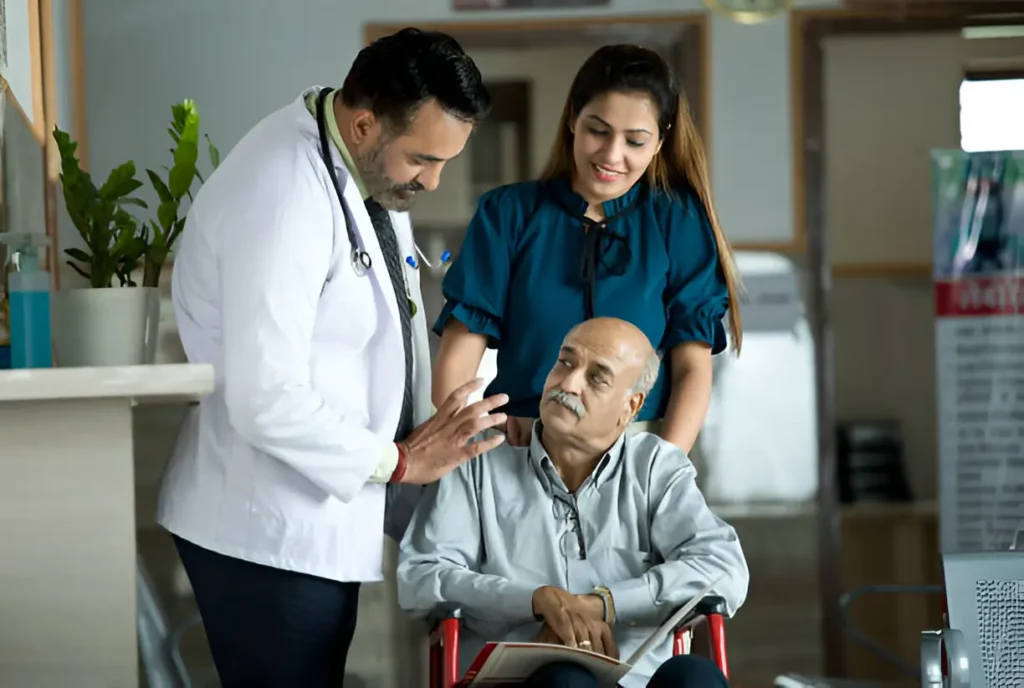Let’s be honest—watching your parents age isn’t exactly what anyone dreams about during their younger years. Health issues start piling up like unopened mail, doctor appointments become a weekly ritual, and suddenly you’re juggling medication schedules that would challenge a pharmacist. The whole situation can leave you feeling like you’re drowning in medical jargon while trying to preserve your loved one’s independence.
Here’s where geriatric doctors step in as your lifeline. These aren’t your run-of-the-mill physicians who squeeze elderly patients into standard treatment templates. Instead, they’ve built their entire practice around understanding the intricate dance of aging—and more importantly, they recognize that senior care isn’t a solo performance. It involves the whole family.
Understanding the Specialized Role of Geriatric Doctors
Senior health care demands a completely different playbook than what works for younger folks, and geriatric specialists have mastered this unique game. Consider this sobering reality: About 10% of all people over the age of 65 have some form of dementia, by the age of 85 that has increased significantly. Those numbers tell a story that standard medical training simply doesn’t prepare most doctors to handle effectively.
That’s where geriatric medicine comes in—it’s not just about treating illnesses, but about understanding the aging body as a whole. Specialists in this field recognize that older adults often face multiple conditions at once, each influencing the other in complicated ways. They look beyond lab results and symptoms to consider factors like mobility, memory, nutrition, and even the patient’s living environment. This comprehensive approach helps ensure care that truly fits seniors’ needs.
You know that moment when you’re frantically googling “geriatric doctors near me” at 2 AM because your mom fell again? Those search results lead you to professionals who’ve invested years beyond medical school learning why your father’s blood pressure medication works differently at 78 than it did at 45.
They understand why a simple urinary tract infection can cause confusion that mimics dementia in older adults. These specialists don’t just treat symptoms; they connect dots that other doctors might miss entirely.
Medical Expertise Tailored for Aging Adults
Think about it this way: would you take your vintage car to a mechanic who only works on brand-new vehicles? Probably not. The same logic applies to healthcare for seniors.
Geriatric physicians complete additional fellowship training specifically focused on how aging transforms everything from kidney function to drug metabolism. They’ve studied why seniors might need different dosages, why certain medications that help 30-somethings can actually harm 80-somethings, and how to spot the subtle signs that distinguish normal aging from serious health concerns.
What really sets them apart? They’re comfortable reducing medication loads instead of constantly adding new prescriptions. That’s revolutionary thinking in today’s healthcare landscape.
Family-Centered Care Coordination
Remember the last time you tried to accompany your parents to a regular doctor’s appointment? You probably felt like an intruder in a private conversation, even though you’re the one managing their daily care.
Geriatric doctors flip this dynamic entirely. They actively welcome family involvement because they understand that effective senior care happens 24/7, not just during office visits. These physicians take time explaining complex diagnoses in plain English and help you anticipate what changes might be coming down the road.
Comprehensive Assessment Services That Make a Difference
Standard doctor visits for seniors often feel rushed and superficial. You’ve probably experienced this: fifteen minutes of questions, a quick physical exam, maybe some blood work, then you’re ushered out with more questions than answers.
Elderly healthcare services from geriatric specialists work differently. They conduct thorough evaluations that examine your loved one from every angle—physical, mental, social, and functional. These comprehensive assessments often uncover issues that families have been worried about but couldn’t quite articulate.
Cognitive Function and Memory Evaluations
Here’s something that might surprise you: many families spend months agonizing over whether their parents’ forgetfulness represents normal aging or something more serious. Geriatric doctors use specialized assessment tools that can distinguish between typical age-related changes and early signs of cognitive decline.
These evaluations provide clarity that can transform your approach to care planning. Instead of wondering and worrying, you’ll have concrete information about your loved one’s cognitive abilities and realistic expectations for the future.
Early detection also opens doors to interventions that can slow progression and improve quality of life for everyone involved.
Functional Capacity and Safety Assessments
Your mother insists she’s perfectly fine living alone, but you’ve noticed she’s lost weight and there are unopened bills scattered on her kitchen counter. Sound familiar?
Geriatricians excel at objectively evaluating how well seniors can handle daily activities like cooking, bathing, managing finances, and taking medications correctly. They assess fall risks using evidence-based tools and provide specific recommendations for home modifications that can prevent dangerous accidents.
These assessments often reveal safety concerns that loving family members miss because they happen gradually over time.
Advanced Chronic Condition Management Strategies
Managing multiple health conditions in seniors requires orchestrating a complex symphony where every instrument must harmonize perfectly. Most doctors treat each condition separately, like individual musicians playing different songs simultaneously. Geriatric specialists conduct the entire orchestra.
Research demonstrates just how challenging this becomes for families: In 530 family caregivers, mediation analyses examining relationships of sleep disturbance, mental health, and quality of life found that those who provided 20 or more hours of caregiving per week to an individual with physical, psychological, cognitive or other impairments had lower quality of life. This data highlights why professional coordination becomes absolutely essential.
Integrated Treatment Plans for Multiple Health Conditions
Instead of treating diabetes, heart disease, and arthritis as separate problems requiring separate specialists, geriatric doctors create unified approaches that consider how these conditions interact. They prioritize treatments based on what matters most to your family member, sometimes choosing comfort over aggressive intervention when that aligns with personal values.
This integrated thinking often produces better outcomes with fewer medications, fewer appointments, and less confusion for everyone involved.
Medication Management and Safety
Polypharmacy—that’s the fancy term for taking multiple medications—poses serious dangers for older adults. Geriatric specialists become medication detectives, regularly reviewing every prescription, over-the-counter drug, and supplement to identify dangerous interactions or unnecessary treatments.
Their expertise often results in simplified regimens that are easier for families to manage while reducing side effects and healthcare costs.
Preventive Care and Wellness Program Development
Most healthcare focuses on fixing problems after they occur. Senior wellness programs developed by geriatric specialists take a different approach—they work to maintain function and prevent complications before they derail your loved one’s independence.
Evidence-Based Prevention Strategies
Geriatricians stay current with research specifically focused on older adults. They customize vaccination schedules, screening recommendations, and preventive interventions based on your senior’s unique health status, life expectancy, and personal preferences.
Prevention might include balance training to reduce fall risk, nutrition counseling to preserve muscle mass, or cognitive exercises designed to maintain mental sharpness.
Mental Health and Social Engagement Support
Depression and anxiety frequently develop in seniors but often get overlooked or dismissed as normal aging. Geriatric doctors recognize how isolation, grief, and physical limitations impact mental health and work with families to address these critical issues.
They understand that social engagement becomes increasingly important as seniors lose friends and family members, often connecting families with community resources that provide meaningful interaction opportunities.
Supporting Families Through Healthcare Transitions
Hospital discharges, nursing home decisions, end-of-life planning—these transitions represent some of the most stressful moments families experience. Geriatric doctors provide crucial guidance during these emotionally charged periods.
Hospital-to-Home Transition Planning
Geriatricians coordinate with hospital teams to ensure smooth transitions home, helping families understand discharge instructions, medication changes, and follow-up requirements. They typically schedule visits shortly after hospital discharge to monitor recovery and prevent readmissions.
This proactive approach reduces family stress while improving outcomes by catching potential complications before they require emergency intervention.
Long-term Care Planning and Decision Support
When families must consider assisted living or nursing home placement, geriatric doctors provide objective assessments of care needs and help navigate available options. They facilitate difficult conversations about goals of care and advance directives.
These discussions, while challenging, help families make decisions that honor their senior’s wishes while ensuring appropriate care levels.
Final Thoughts on Geriatric Care Support
Choosing geriatric care transforms the overwhelming experience of supporting aging loved ones into something manageable and coordinated. These specialized physicians understand that senior healthcare affects entire family systems, not just individual patients. They offer expertise that extends beyond medical treatment to encompass emotional support, practical guidance, and realistic planning for the future.
When you’re feeling lost in the maze of senior healthcare decisions, geriatric doctors serve as experienced guides who help preserve your loved one’s dignity while supporting your family’s wellbeing throughout this challenging but meaningful journey.
Common Questions About Geriatric Care for Families
How much does Medicare pay for family caregivers?
Medicare does not offer reimbursement for family caregivers. It also doesn’t provide payment for long-term care services like In-home care services or adult day services.
When should families consider switching to a geriatric doctor?
Consider switching when your senior has multiple chronic conditions, takes several medications, experiences frequent falls, shows cognitive changes, or when care coordination becomes challenging for the family.
Do geriatric doctors help with medication management?
Yes, geriatricians specialize in medication management for older adults, including reducing unnecessary prescriptions, managing drug interactions, and simplifying medication schedules for easier family management.
Read more: Find the Perfect Wig: Best Wig Websites for Black Women



